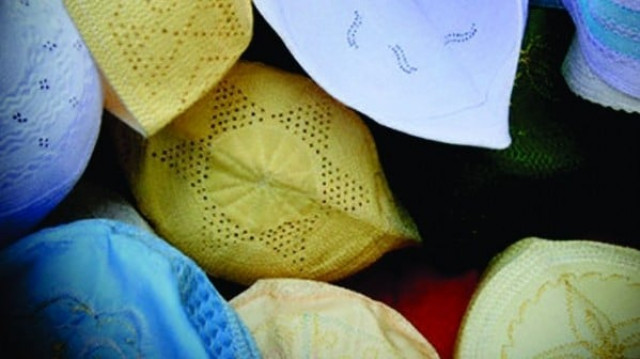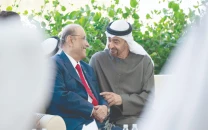The widening split

The widening split
“If they can burn my effigy, they can also kill me,” says a worried Mufti Muhammad Naeem, the founder of one of the most powerful Deoband madressahs in the country, the Jamia Binoria in Karachi.
Former inspector general police Jehangir Mirza warns that the volatile situation between Deobandi and Barelvi Sunni groups can easily spiral out of control, and inflame sectarian tensions. “Unless either the maulanas start the process of reconciliation among themselves or the government steps in to cool the temperatures, any anti-Pakistan element can exploit the situation to foment sectarian violence among Sunnis in the country,” says Mirza.
Naeem was referring to a rare incident that occurred in the city recently, when dozens of men chanting anti-Taliban slogans stormed out of the New Memon Masjid near the II Chundrigar Road after Friday prayers and blocked a main thorough fare. Their demand: an end to the “centers of Taliban” in the city.
The protesters lumped clerics of Naeem’s Deoband circle, including Mufti Taqi Usmani, Mufti Rafi Usmani, Maulvi Asad Thanvi and Mufti Usman Yar with the Taliban and alleged that all of them were on the payroll of America, Israel and India. Mufti Naeem’s effigy was in fact first ‘hanged’ before it was set on fire by an enraged crowd.
The rally was organised by leaders of the Markazi Jamaat Ahle Sunnat Pakistan (MJASP), one of the 4,000 Sunni Barelvi organisations active in the city. There was some truth in the fears expressed by the Barelvis. Last time a Barelvi cleric, Mufti Sarfraz Naeemi, openly denounced the atrocities of Taliban and their sympathisers in Lahore, he was killed in a suicide attack on June12, 2009.
Deoband vs. Barelvi
Sunnis in Pakistan are broadly categorised into three: the Deobandi, the Barelvi and the Ahle Hadith. “The majority of the Sunni population follow the Barelvi line even when not part of any formal grouping; they visit shrines of revered saints and participate in festivities to mark the birthday of the Holy Prophet (pbuh) with fervour,” says the Barelvi cleric, Maulana Shabbir Abu Talib, who was part of the rally against the Deoband clergy.
The Deoband belief, however, is against any such practices and comes close to the rigid Wahabi ideology, which tracks its roots to Saudi Arabia.
The prominent Barelvi organisations in Pakistan include Jamiat Ulema-e-Pakistan (JUP), Jamaat Ahle Sunnat, MJASP, Daawat-e-Islami and the Sunni Tehrik (ST). According to Shabbir, there are thousands of Barelvi organisations across the country, with many restricted to just one neighbourhood. Even though the numerous Barelvi groups do not operate as a monolith, they take lead from the national-level body, the Sunni Ittehad Council led by Mufti Muneebur Rahman. The Tanzimul Madaris of the Barelvis has more than 6,000 madressahs registered with it.
The well-known Deobandi organisations include Jamiat Ulma-e-Islam (JUI)-one faction led by Maulana Fazlur Rehman and the other by Maulana Samiul Haq; the Jamaat-e-Islami, Tahafuze Khatame Nabuwat, and the Tableeghi Jamaat. The Wafaqul Madaris Al Arabia Pakistan has at least 7,000 Deoband madressahs registered with it, where an estimated 500,000 students study.
The current tension between the Deobandis and Barelvis began with the recently concluded Eid Miladun Nabi celebrations, when massive processions were taken out on the streets across the country, including Karachi and Peshawar. Deoband clerics like Mufti Naeem had criticised the ‘unIslamic’ public rallies held in fervor of the prophet (pbuh). These processions were then attacked in Faisalabad and D.I. Khan resulting in the death of several people, which was blamed on the proscribed militant group Sipahe Sahaba Pakistan (SSP).
Militant streak
Counter terrorism specialist of the Karachi police force Raja Umer Khattab informs that all Jihadi groups involved in terrorism, including the Tehrik Taliban Pakistan, SSP, Lashkkar-e-Jhangvi, Jaishe Muhammad, and Jundullah are ideologically Deobandi or Wahabi. “Barelvi groups like the ST too have a tendency for sectarian violence, but they act in reaction and have to date been involved in incidents like taking over a rival sect’s mosque etc.”
Senior ST leader Allama Khizrul Islam claims “all Deobandis are terrorists”. He disagrees with the claim that the state is no longer backing these elements because the influence of banned outfits like the SSP doesn’t seem to waning. In fact it is gaining strength, he says. The Barelvi cleric then goes on to cite the example of Punjab Law Minister Rana Sanaullah who announced his PML-N party’s intentions to form an electoral alliance with SSP leader Ahmed Ludhianvi in a by-election.
Mufti Usman Yar, the deputy general secretary JUI-Sami, when confronted with these allegations said, “the Deoband groups are being framed.” He admitted that even today the Deoband supported the ‘jihad against foreign powers’ in Iraq and Afghanistan, but “we condemn all forms of terrorism, including suicide attacks that are taking place inside Pakistan.”
Role of agencies
Rivalries between the Deoband and Barelvis are nothing new, says former interior minister Moinuddin Haider, who lost his brother in an attack by extremists.
“During Gen Ziaul Haq’s time the Deoband groups got a boost, especially because most of them supported the jihad against Soviet forces in Afghanistan and provided the foot soldiers. The dictator in fact tried to enforce the Deobandi (version of Islam) as the state religion,” he said.
“Post 9/11, however, we saw Gen Musharraf taking a U-turn on Pakistan’s Taliban policy and with it we saw a clampdown on groups like the SSP and promotion of ‘moderate’ groups such as the creation of the Council for Promotion of Sufism with Chaudhry Shujaat in the chair.”
But is the establishment now promoting the Barelvi forces as opposed to the hard-line Deobandi groups of the Zia years? And, if so, will this shift work? Also, how will we prevent them from becoming monsters?
“The establishment is keeping both options open,” says analyst Ayesha Siddiqa. “They have partially armed some Barelvi groups, but there is no serious deployment. The main reason is that they continue to patrionise the Deoband groups as well. Unless and until there is a decision to abandon all of them forever, nothing will happen. There is no strategic shift so far.”
Battle for urban space
Historian Ayesha Jalal, author of the book Partisans of Allah, sees the current struggle between Deoband and Barelvi forces as a “battle for urban space,” hinting at the frequent clashes between the ST and SSP in cities like Karachi, where the issue is usually about possession of mosques. “The Barelvis are reclaiming the ground lost to the Deoband over the years. They’re interested not only in gaining territory in places like Karachi, but are also now fighting for political space.”
Binoria town’s Mufti Naeem agrees that basically this is all a fight for resources. “This war is for the stomach,” he remarked, while pointing at his own bulging waist. “Barelvis are only interested in the money that comes through charity at madressahs or mosques and to gain recognition by propaganda. But they are fools to believe that people will fall for their ignorant practices.” It is this kind of talk that fuels more fire on the streets of Pakistan.


















COMMENTS
Comments are moderated and generally will be posted if they are on-topic and not abusive.
For more information, please see our Comments FAQ